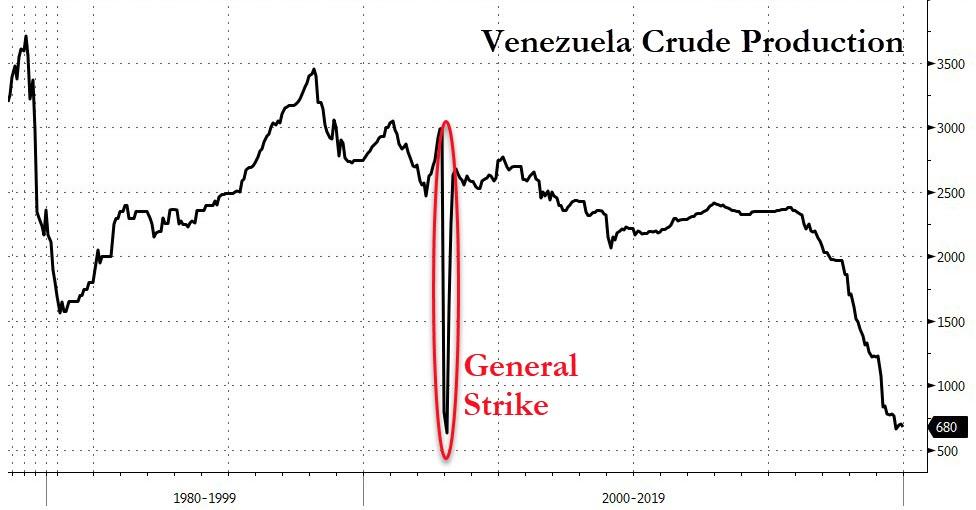There’s only one path to rebuilding Venezuela, and it’s paved with oil. For the time being, that path leads nowhere.
The key to controlling everything now lies with the National Assembly, the only body with the power to hand out oil licenses—and Maduro’s recent scheme to retake control of the country’s oil may just have been foiled by more Trump sanctions.
Venezuela is the 12th largest oil producer in the world and home to the world’s largest oil reserves--all of which is irrelevant as long as it remains in the throes of a deep economic and humanitarian crisis amid runaway corruption, a devalued currency and crippling sanctions by the U.S. and the EU.
Maduro’s attempt to cling to power is relentless, but in his quest this past week to take control of the oil industry, Washington was paying close attention. And now, the rogue president and his government have suffered another major blow, with the US imposing fresh sanctions on seven Maduro acolytes.
Legislative Crisis
Last week, Venezuela plunged into a major legislative crisis after soldiers and pro-Maduro supporters barred U.S.-backed opposition leader Juan Guaidó and his deputies from entry into congress before quickly naming Luis Parra, a former opposition lawmaker who recently defected to the Maduro camp, as head of a pro-government assembly.
Maduro loyalists and Guaidó’s opposition legislators engaged in a showdown of claims and counterclaims that left neither side with clear control of the assembly.
Diplomats and energy consultants see the latest drama as a move by Maduro to continue to cling to power by gaining control of congress and legitimizing investments by Russian, Chinese and other deep-pocketed investors in a bid to revive the country’s collapsing oil industry.
Russia, China, India and Turkey have been demanding legal security from Caracas even as they look to tap the country’s cheap energy and mining assets.
Venezuela’s national assembly is the last independent government institution with the sole mandate to legally approve oil-licensing deals, thanks to a law crafted by Maduro’s leftist predecessor, the late Hugo Chávez, which gave state oil monopoly PDVSA (Petróleos de Venezuela) majority financial stakes and mandatory operational control.
Had the congress takeover been successful, Maduro’s supporters would have been in a position to draft a new law that would confer legal powers to foreign companies to run day-to-day operations for oil projects in the country.
It would have been similar to Mexico’s massive energy reforms (now being undone) that opened up the country to foreign investors and destroyed a state-run monopoly. Under any other circumstances, the West would have been rather excited at this prospect—but not where it concerns Venezuela.
“This whole operation reflects the extreme necessity of the regime to try and give legitimacy to contracts, especially in the oil sector,” Luis Stefanelli, a former opposition lawmaker who went into exile to escape state persecution, told the WSJ.
Venezuela’s Crude oil production has plunged from 3.2 million barrels/day before President Obama imposed the first sanctions on the country in 2015 to just 700,000 barrels/day currently due to the international sanctions even as the government lacks funds to maintain derelict oil infrastructure.
Meanwhile, the country’s economy has contracted 60%, clearly underlining the importance of oil to the country’s coffers.
Moscow to the Rescue?
Caracas will no doubt be counting on Moscow to come to its rescue-- as it has done several times in the past.
Russia has repeatedly expressed unflinching support for Maduro, going as far as providing military support even after Washington prohibited its allies from doing any business with the nation. Washington has in the past accused Moscow of providing assistance to Caracas in the movement of gold and oil, helping to finance, market and ship the commodities in ways that circumvent U.S. sanctions.
Make no mistake about whose side Russia is on in the latest saga: The nation was one of the few nations to brazenly applaud Maduro’s latest antics. But that’s because it wants a return on its investment, in the least.
Maduro remains the de facto head of state thanks to the backing of the armed forces, in addition to the backing of heavyweights like Russia, China and India who salivate at the prospects of exploiting the nation’s vast mineral riches.
Guaidó, on the other hand, is the legitimate leader of Venezuela’s Congress and also enjoys the backing of the United States; however, his support could be weakening as evidenced by dwindling volumes of followers at his rallies.
And certainly, Maduro and his cohorts are already devising a new workaround to thwart Washington’s efforts.
Jay Park, the CEO of oil and gas explorer Recon Africa, is a Latin America expert who helped Mexico’s Pemex seal its first-ever joint venture deal. He knows the region better than most, and he is an expert at navigating the oil-political nexus.
In the case of Venezuela, Park told Oilprice.com that it’s difficult to see Maduro leaving anytime soon.
“He’s survived U.S. sanctions and local opposition, and no one seems willing to take the military step to show him the door,” Park said.“Even if they did, it would take a number of years for Venezuela’s oil industry to come back.”


No comments:
Post a Comment
Note: Only a member of this blog may post a comment.